The ‘Irish factor’ in the outbreak of war in 1914
Published in 20th-century / Contemporary History, Features, Home Rule, Issue 4 (July/August 2011), Volume 19, World War I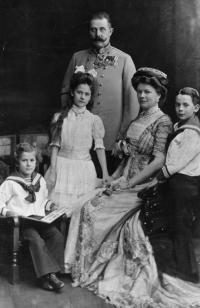
The heir to the Austro-Hungarian imperial throne, Archduke Franz Ferdinand, and his family. The assassination of the archduke and his wife in Sarajevo on 28 June 1914 by a young Serbian nationalist provoked the ‘July crisis’, which coincided with the failure of the Buckingham Palace conference on Home Rule.
After the signing of the Entente Cordiale in 1904 between the French and the British, Irish separatists quickly turned towards the Germans as potential allies. Kaiser Wilhelm II was in fact closely following the Irish crisis. He was personally kept informed by Dr Theodor Schiemann, a historian, who was secretly corresponding with George Freeman. Freeman was a journalist specialising in foreign affairs working for the Gaelic American in New York, the newspaper owned by the Irish republican and Clan na Gael leader John Devoy. Most of their correspondence concerned anti-British propaganda and occasionally work of a cloak-and-dagger nature. It remains difficult to know to what extent Schiemann influenced the Kaiser or German foreign policy but there is a hint. Former chancellor and secretary of state Bernhard von Bülow hated Schiemann and believed that his influence was fatal. As for the Kaiser, he became increasingly frustrated by Britain’s attitude towards Germany and increasingly aggressive in his comments regarding Ireland. He was being kept up to date about the latest developments by reports from his embassy in London. His marginalia show his interest in the Irish crisis. It must be emphasised, though, that these early contacts between Irish nationalists and Germans did not result in concrete measures. After all, when the war broke out in 1914 there was no rising in Ireland. Not even contingency plans had been made, something bitterly regretted by Freeman in 1915. Deep down the Germans probably still believed that they could reach an agreement with the British and make sure that they did not interfere in a general war on the Continent.
Ireland and the ‘July crisis’
The Home Rule crisis intensified when, in 1913, the unionists set up the Ulster Volunteer Force and the nationalists retorted by establishing the Irish Volunteers. It now looked as if a large-scale civil war was only a matter of time. King George V told the Austro-Hungarian ambassador, Count Albert von Mensdorff, that he was seriously concerned.Interestingly, the Germans got wind of this information through their embassy in Turkey. When the Austro-Hungarian Archduke Franz Ferdinand was assassinated in Sarajevo on 28 June 1914 by a young Serbian nationalist, tensions escalated between rivals Austria-Hungary and Serbia.
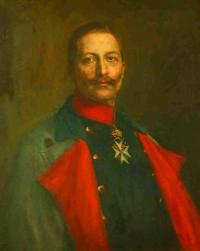
Kaiser Wilhelm II—his marginalia show his interest in the Irish crisis.
This was the pretext for war that the Germans had been awaiting. Historians have named it the ‘July crisis’, during which politicians, diplomats and military men were wondering who was going to do what. As the Austrian historian Manfried Rauchensteiner has put it, it was clear that the Germans were using the July crisis for their own purposes, as the Austro-Hungarians were using the Germans to support them.
What was the role of the Irish crisis in the unfolding events that would lead to the war? There can be no doubt that the combination of the Serbian and Irish crises was a lethal cocktail. On 12 July the Austro-Hungarian ambassador in Berlin, Count Ladislaus Szögyény, informed Vienna that the Germans were of the opinion that the British were not itching for a fight. It seems certain that Szögyény had the Irish crisis in mind. Indeed, on 18 July, just five days before Austria-Hungary would issue her fateful ultimatum to Serbia, demanding humiliating terms and being in fact only a ploy to invade Serbia, the German under-secretary of state, Arthur Zimmermann, privately declared that Britain did not want the crisis to degenerate into a full-scale war on the Continent because of the situation in Ireland. On 21 July the German secretary of state, Gottlieb von Jagow, told Admiral Behnke that the British would not enter a war. In Berlin, the Irish Home Rule crisis seemed like a godsend.
Failure of Buckingham Palace conference on Home Rule
But in London Mensdorff was genuinely working for peace and feared that things could get seriously out of control. In two telegrams, sent on 23and 24 July, he warned Foreign Minister Leopold von Berchtold in Vienna that it was not clear what Britain’s attitude would be in the crisis.
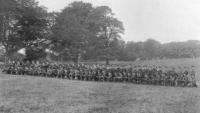
West Belfast Ulster Volunteers training at Fernhill House, Glencairn, in 1914. The Home Rule crisis intensified when, in 1913, the unionists set up the Ulster Volunteer Force and nationalists retorted by establishing the Irish Volunteers.
The warning fell on deaf ears. On 24 July the Buckingham Palace conference in London failed to find a last-minute compromise between Irish nationalists and unionists: civil war in Ireland seemed a step closer. On 25 July Belgrade rejected Vienna’s ultimatum. On 26 July British soldiers in Dublin opened fire on a nationalist crowd on Bachelor’s Walk after agunrunning operation for the Irish Volunteers. The rifles had beenbought in Germany by Roger Casement. Four people died and 40were wounded. The long-awaited civil war now looked to be on its way.
Albert Ballin, a ship-owner and personal friend of the Kaiser, had been sent to London to ascertain the political situation. On 27 July, the day after the shooting in Dublin, he reported to Berlin that Britain’s reactionto Austria-Hungary’s ultimatum to Serbia had been very ‘mild’.He related itto the ‘present situation’. Undoubtedly Ballin had the Irish crisis in mind.
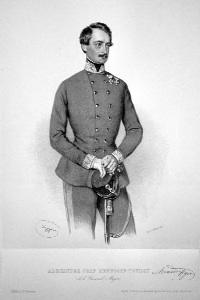
Count Albert von Mensdorff, Austro-Hungarian ambassador in London—King George V told him that he was seriously concerned about the Irish situation.
The same day, Germany advised Austria-Hungary to reject a British offer of mediation emanating from the foreign secretary, Sir Edward Grey. The Austro-Hungarians took this piece of advice. Why should they accept the offer from a disunited United Kingdom? Eventually, on 28 July, Austria-Hungary attacked Serbia. It was the first act of the First World War. Now all the great Continental powers became involved one after the other. But what would Britain do?
On 30 July, Liberal Prime Minister Herbert Asquith was examining a map of Ulster in the cabinet room when he received a telephone message from the leader of the opposition, the Conservative Andrew Bonar Law. He asked Asquith to meet him and Sir Edward Carson, the unionist leader, at his Kensington abode. Intrigued, the prime minister accepted. Once there, he was told by Bonar Law that for the time being the second reading of the amending bill regarding Home Rule should be postponed ‘in the interest of the international situation’, as he was of the opinion that it was not good to expose the United Kingdom’s weaknesses at this precisemoment. According to Asquith, ‘I agreed and read to them the latest telegrams from Berlin which, in my judgement, assume that the German government are calculating upon internal weaknesses to affect our foreign policy’. So Asquith knew that there was a correlation between the Serbian and Irish crises. Nevertheless, he did nothing much or, at least, he was not firm enough. The problem for him was not only the Irish crisis but also his cabinet, which was divided over the prospect of being involved in a Continental war. Even though theGerman naval menace had been seen as a threat for several years now, would a war be in Britain’s interest?
British indecision
The British showed indecision just at a crucial moment. On 30 July the Russian army mobilised to assist Serbia. Berlin immediately demandedthat the Russian government demobilise and asked Britain to remain neutral in the escalating conflict.
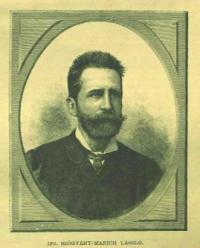
Count Ladislaus Szögyény, Austro-Hungarian ambassador in Berlin—on 12 July he informed Vienna that the Germans were of the opinion that the British were not itching for a fight.
Grey’s attitude was one of ‘wait and see’. On 31 July Paul Cambon, the French ambassador in London, got a phone call from Paris. Prime Minister René Viviani wanted to know what the British would do. He got no definite answer simply because there was none that could be given. On 1 August Germany declared waron Russia. In London, Grey was telling a dismayed Count Alexander Benckendorff, the Russian ambassador, that British assistance could not be guaranteed. Benckendorff reported to Foreign Minister Sergei Sazonov in St Petersburg: ‘Grey said that certain circumstances could cause the English to intervene but that the presentdifficulties made it hard to send a force of even only 100,000 men to the continent, a forcewhich the government could use for possible inner troubles in the kingdom’. The ‘present difficulties’ was an obvious allusion to the Irish crisis. The same day, Grey told an equally dismayed Cambon that a British expeditionary force (BEF) would not leave for the Continent. On 2 August a dispatch reached the British government that German troops had entered Luxembourg. The British cabinet decided to meet at once, as it was clear that the next German objective would be Belgium. In fact, it met twice that day. In the morning it was decided that the French coast would be protected by the Royal Navy. In the evening it was decided that if the German army violated Belgian territory the United Kingdom would declare war.
On 3 August Germany declared war on France, and Belgian territory was violated. King Albert I of the Belgians appealed for British assistance, as London was bound to defend Belgian neutrality under a treaty signed in 1839. At 3pm, Grey entered a packed and tense House of Commons.
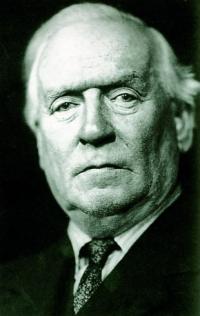
The British prime minister, Herbert H. Asquith—at a meeting on 30 July he informed unionist leaders Andrew Bonar Law and Sir Edward Carson that ‘. . . the German government are calculating upon internal weaknesses to affect our foreign policy’. (George Morrison)
In his speech, he stated that the crushing of France and the violation of Belgium’s neutrality would not be tolerated. He then suddenly lifted his voice and said: ‘One thing I would say: the one bright spot in the very dreadful situation is Ireland. The position in Ireland—and this I should like to be clearly understood abroad—is not a consideration among the things we have to take into account now.’ This confirmed that Germany and Austria-Hungary were relying on Ireland’s paralysing influence. That same day, Field Marshal Franz Conrad von Hötzendorf, the Austro-Hungarian commander-in-chief, wrote in his diary: ‘England’s attitude proves to be unfriendly and doubtful. To [our] Military Attaché [in London], it seems, however, that there is no desire for war for the time being, taking into account the Ulster crisis and the civil war.’ To point out that Conrad and his military attaché were wrong, as there was no civil war in Ireland, is to miss the point. What matters here is their interpretation, and this interpretation must have encouraged Conrad and others in persevering in their offensive against Serbia.
Redmond’s intervention
That there was no civil war was largely due to John Redmond’s crucial intervention, just after Grey’s speech,when he declared that the Irish Volunteers would stand shoulder to shoulder with the Ulster Volunteers to defend Ireland together against a foreign invasion—in other words, a German invasion. It can safely be said that the nationalist leader spoiled the expectations of Berlin and Vienna, and also very likely altered the course of European history. After all, what would have happened if hehad demanded the immediate implementation of Home Rule for the whole of Ireland? After Redmond’s speech, Mensdorff cabled Berchtold that the British were united, stressing that nationalists and unionists were too. But it was now too late. On 4 August a united United Kingdom declared war on Germany, and on 12 August on Austria-Hungary. The First World War was in full swing.
A.T.Q. Stewart’s assertion that the Irish Home Rule crisis played an important role in Germany’s policy is well founded. It was that crisis, coupled with the fact that the cabinet was divided, that explained why it took theBritish so long to commit themselves to supporting the French and the Russians.

John Redmond addressing Irish Volunteers. That there was no civil war in Ireland was largely due to his crucial intervention, just after Foreign Secretary Sir Edward Grey’s speech to the House of Commons on 3 August, when he declared that the Irish Volunteers would stand shoulder to shoulder with the Ulster Volunteers to defend Ireland against a foreign invasion—in other words, a German invasion. (George Morrison)
Baron Eugène Beyens, the Belgian minister in Berlin at the time, suggested that the outcome of the July crisis might have been different if the British government had been firmer in its attitude towards Germany. This, however, will always remain in the realm of hypothesis. But Beyens also explained that the Irish question was like a sword of Damocles for Asquith’s cabinet and here he was definitely right. What is amazing is that it took so long to relate it to the July crisis. Published books dealing with the outbreak of the war rarely take the Irish crisis into account and, when they do, it is only in avery superficial way, disconnected from Continental events. Archival research proves that there was an important ‘Irish factor’ in that summer of 1914. HI
Jérôme aan de Wiel lectures in history at University College Cork.
Further reading:
J. aan de Wiel, The Irish factor, 1899–1919: Ireland’s strategic and diplomatic importance for foreign powers (Dublin, 2010).
















